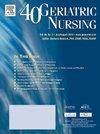Relationship between stigma and negative emotions among patients with Parkinson’s disease: The mediating role of health literacy and family function
IF 2.5
3区 医学
Q3 GERIATRICS & GERONTOLOGY
引用次数: 0
Abstract
Background
Parkinson’s disease is a neurodegenerative disorder causing physical and psychological challenges. Stigma exacerbates negative emotions, resulting in anxiety and depression, as well as undermining self-perception and social participation. Health literacy aids in disease management, and family function plays a crucial supportive role. However, the interplay between these variables remains underexplored.
Objective
To examine the chain mediating effects of health literacy and family function between stigma and negative emotions in patients with Parkinson’s disease.
Methods
This study adopted a cross-sectional design, recruiting eligible patients from a tertiary hospital in Guangzhou, China. A total of 245 participants completed questionnaires on stigma, health literacy, family function and negative emotions. Statistical analyses were performed using Spearman’s correlation and mediation effect analysis.
Results
Negative emotions were positively correlated with stigma (β = 0.584) and inversely associated with health literacy (β = −0.258) and family function (β = −0.144). Mediation effect analysis showed that the mediating effects of health literacy, family function, and their combined effects on the relationship between stigma and negative emotions were 0.033, 0.020, and 0.008, respectively, accounting for 8.89%, 5.39%, and 2.16% of the total effect.
Conclusions
Stigma in patients with Parkinson’s disease not only directly affects negative emotions but also indirectly influences them through health literacy and family function.
帕金森病患者病耻感与负性情绪的关系:健康素养和家庭功能的中介作用
帕金森病是一种神经退行性疾病,引起身体和心理上的挑战。耻辱加剧了负面情绪,导致焦虑和抑郁,并破坏了自我认知和社会参与。卫生知识有助于疾病管理,家庭功能起着至关重要的支持作用。然而,这些变量之间的相互作用仍未得到充分探讨。目的探讨健康素养和家庭功能在帕金森病患者病耻感与负性情绪之间的连锁中介作用。方法本研究采用横断面设计,从广州某三级医院招募符合条件的患者。共有245名参与者完成了关于耻辱、健康素养、家庭功能和负面情绪的问卷调查。统计学分析采用Spearman相关分析和中介效应分析。结果负性情绪与病耻感呈正相关(β = 0.584),与健康素养(β = - 0.258)和家庭功能(β = - 0.144)呈负相关。中介效应分析显示,健康素养、家庭功能及其联合效应对污名与负性情绪关系的中介效应分别为0.033、0.020和0.008,分别占总效应的8.89%、5.39%和2.16%。结论耻辱感不仅直接影响帕金森病患者的负性情绪,还通过健康素养和家庭功能间接影响帕金森病患者的负性情绪。
本文章由计算机程序翻译,如有差异,请以英文原文为准。
求助全文
约1分钟内获得全文
求助全文
来源期刊

Geriatric Nursing
医学-护理
CiteScore
3.80
自引率
7.40%
发文量
257
审稿时长
>12 weeks
期刊介绍:
Geriatric Nursing is a comprehensive source for clinical information and management advice relating to the care of older adults. The journal''s peer-reviewed articles report the latest developments in the management of acute and chronic disorders and provide practical advice on care of older adults across the long term continuum. Geriatric Nursing addresses current issues related to drugs, advance directives, staff development and management, legal issues, client and caregiver education, infection control, and other topics. The journal is written specifically for nurses and nurse practitioners who work with older adults in any care setting.
 求助内容:
求助内容: 应助结果提醒方式:
应助结果提醒方式:


